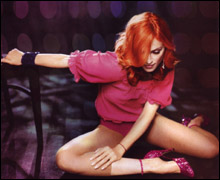 I keep waiting for Madonna to have her James Frey moment. Some Jewish Web site like Jewlicious.com will be searching for a photo of Madonna in her Zohar whites at the Kabbalah Center and won’t be able to find it. Upon further investigation, it will be revealed that Madonna isn’t a member of the Center, she’s just on its mailing list, and that she doesn’t regularly meet with rabbis, though she did have a conversation with one once at a shabbas dinner at Demi and Ashton’s. Esther, it will turn out, isn’t her Hebrew name but the alias she uses at hotels. And though it’s true she no longer does concerts on Friday nights, that’s only because none of her new Jewish fans who do keep the Sabbath would buy tickets to those shows.
I keep waiting for Madonna to have her James Frey moment. Some Jewish Web site like Jewlicious.com will be searching for a photo of Madonna in her Zohar whites at the Kabbalah Center and won’t be able to find it. Upon further investigation, it will be revealed that Madonna isn’t a member of the Center, she’s just on its mailing list, and that she doesn’t regularly meet with rabbis, though she did have a conversation with one once at a shabbas dinner at Demi and Ashton’s. Esther, it will turn out, isn’t her Hebrew name but the alias she uses at hotels. And though it’s true she no longer does concerts on Friday nights, that’s only because none of her new Jewish fans who do keep the Sabbath would buy tickets to those shows.
There will be podcast apologias available for download from iTunes and debates in Hollywood over whether or not it’s still appropriate for her to star in a remake of Yentl. She’ll have to go on Jon Stewart, not Oprah, and in her defense, she’ll say, “Why do you think I named the new album Confessions on a Dancefloor? Did anyone believe I was really a virgin back in the ’80s?”
No such luck. Madonna’s memory of her recent Jewish past is still intact, though she’s been coy when it comes to “Isaac,” a silky flush of chill-room exotica that’s become known as her “Kabbalah song.” When Confessions was released last November, the song got her into hot water with a few rabbis who believed she had written a club hit for Isaac Luria, one of the most revered 16th-century Jewish mystics. “Jewish law forbids the use of the name of the holy rabbi for profit,” Rabbi Rafael Cohen said in his best Pat Roberston imitation. “Her act is just simply unacceptable, and I can only sympathize for her because of the punishment that she is going to receive from the heavens.”
Madonna fired back by admitting she didn’t know enough about Luria to write a song for him. She did know enough about the other Isaac — Abraham’s son, the one who was almost sacrificed in a divine game of chicken in one of the most debated passages of Genesis — to have originally given the song a title better suited to a Torah study session than a TRL countdown, “The Binding of Isaac.” Compared with other “binding of Isaac” songs — Leonard Cohen’s “Song of Isaac,” Bob Dylan’s “Highway 61 Revisited,” or even Steve Reich’s churning “The Binding of Isaac” — Madonna’s is pretty tame, though more celebratory in its Jewishness. Between Hebrew chants from London rabbi Yitzhak Sinwani, she runs through some vague prayerisms — broken spirits, open gates — and then nods to the Genesis tale with an empathetic vision of Isaac “staring up into the heavens in this hell that binds your hands.”
The point, though, is not which Isaac Madonna is singing about but that she’s singing about an Isaac to begin with. Do we really want our pop stars to be God brokers, torch bearers of Testaments, Old or New? When Bono showed up at President Bush’s National Prayer Breakfast a few weeks ago, he sure seemed to think so. He stooped to God talk when he pleaded with 3M to remove policy restrictions that keep poor countries from accessing necessary medical supplies. “God will not accept that,” he said. “Mine won’t. Will yours?”
ADVERTISEMENT
 |
Madonna shouldn’t be singled out for her mystical awakening into the cult of the red bracelet when Bono is busy debating religious relativism with the president of the United States. But the fact that you can hear her Jewphilia on a pop station and then flip to alt-rock radio and hear Lubavitch Hasidism’s first Billboard-charting superstar, Matisyahu, demanding “Mosiach now!” on his “King Without a Crown” begs a larger question: how has Judaism become the new Christianity?
On “Roots in Stereo,” a duet between Matisyahu and Christian rap-rockers P.O.D. on the metal band’s latest Atlantic release, Testify, there doesn’t seem to be any difference between the two religions. In the song’s spliffy rude-boy blur where we’re all “the blood of God’s veins,” Jewish redemption and Christian redemption turn out to be the same thing after all.
Not that anyone seems to be listening too closely to what Matisyahu — once a Phish-following burnout named Matthew Miller who traded in his white-boy dreads for ultra-Orthodox Judaism — has been singing about. (Or for that matter, whether he’s even been on key.) He’s a Hasid on the mike! A black hat down for the boom bip! Just check the come-one-come-all circus-freak headlines: “Rebbe Rudeboy,” “Where Peter Tosh Meets Mazel Tov,” and of course, Stuff’s call to “check his circumcised rhymes.”